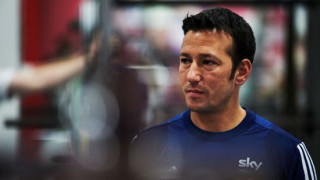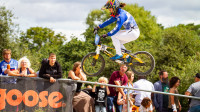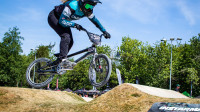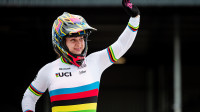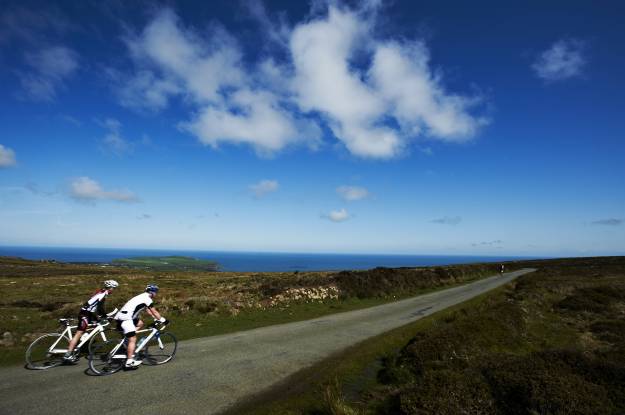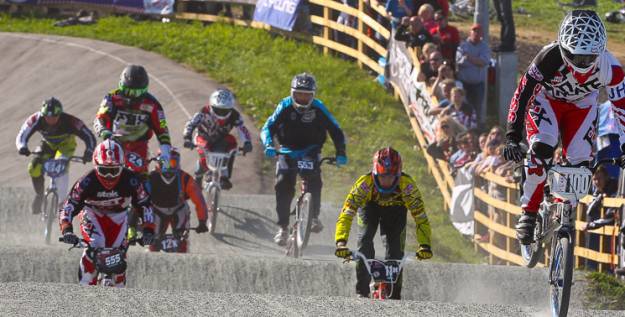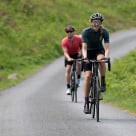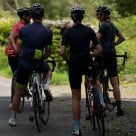| Follow britishcycling.org.uk on |
|
|
British Cycling BMX Talent Team Launch
Posted December 6 2010
Words and Photography By Luke Webber
BMX: Road To 2012
British Cycling's Performance Programmes Explained
Team GB BMX Roster | Join Team GB
Following the announcement of riders onto British Cycling's Olympic Performance Programmes for BMX, British Cycling Coach Jeremy Hayes introduces the Talent Team at the first training camp of the season. Luke Webber was there to document the progress made from 2009.
It's 6am on the first day of winter, but for those chosen to represent British Cycling's Olympic Talent Team there's no chance of hibernation. Every morning a narrow flashlight beam, manned by Coach Jeremy Hayes makes its way across the densely frosted grass, followed by a series of crunching footsteps.
Hayes insists it's the sound of hard work; the sound of bare knuckles meeting the sub-zero ground as every rider drops for another series of push ups in a gruelling circuit training regime that starts each day before sunrise.
Over breakfast it's obvious comments made by British Cycling's Olympic BMX Coach, Grant White are now having effects in camp - and with a packed four days of training lined up at the Talent Team induction, the preconception of what it takes to be world class becomes reality.

FUTURE CHAMPIONS
British Cycling's Talent Team represents the first formal step onto the Performance Pathway, as BMX athletes between 14 and 17 years of age are granted access to British Cycling's coaching resource and facilities.
Chief of that resource is Grant White, who oversees British Cycling's BMX Olympic Programmes and focuses on Podium and Academy athletes, while Jeremy Hayes, British Cycling's ODP Coach, oversees the Talent Team, the Olympic Development Programme and regional talent coaching.
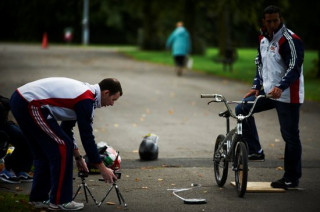
Left - Grant White, British Cycling BMX Olympic Coach, right - Jeremy Hayes
As most Talent Team athletes are still in compulsory education, the entry-level programme consists of remote coaching and training camps - the induction representing the first and most important camp of all.
From reinforcing the British Cycling rider code of conduct, to setting goals and training plans for the forthcoming season, the induction camp ultimately aims to set a tone for developing riders into Olympic medallists. And unashamedly, Hayes' tone for the Talent Team focuses on skills and technique over strength and power - a mantra consistent with the system he implemented when bringing BMX World Champion Shanaze Reade through the ranks.

Shanaze Reade - a product of British Cycling's BMX Programmes
EVERYTHING IS A SKILL
Hayes' belief is that everything required to be a BMX champion is a skill - from riding the bike, to lifting in the gym - and it is these skills that need to be developed into habit at a young age.
Conditioning training is important, the development of power is essential, but not at the expense of core skills; something which will hinder developmemt in even the best conditioned athletes further in their professional careers.
Nowhere has this been more evident than in gym sessions. At the 2009 Talent Team Induction Camp, most riders were lifting bars only, focussing on the skill of lifting, correct body position and advanced training techniques, over personal best lifts. In 2010, those progressing into their second Talent Team years have not only made perfect lifting technique a habit, but have added weight and already have a plan for progression in place.

The session in question takes place at Sheffield EIS and is hosted by Mark Campbell - strength and conditioning coach to ODP rider Abbie Taylor - who sets about assessing the progress of each rider to define their training for winter. For those new to the Programme it is a case of initial assessment of bar technique, before any decisions can be made.
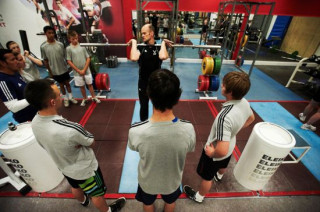
ON THE BIKE
From the gym, the Talent Team immediately transferred to the bike at nearby Rotherham. But instead of taking immediately to the track, Hayes deploys a series of car park drills, lasting two hours. And for those that question the relevance of such sessions, Hayes has a thorough answer.

"Taking the skills away from the track is a great leveller. There are too many riders who can manual on a track, albeit without any skill. Add some flat pedals to the mix and it becomes even more obvious.
"Taking the skills away from the track serves to exaggerate differences in ability - on our 20 second slalom test track, there were riders who would be less than a second apart at a British BMX Series race, who were separated by two, three seconds on a flat concrete area. That proves it is all about technique; something you can hide on a BMX track.
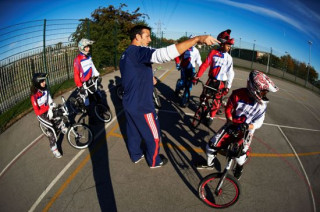
"By running these sessions on core skills - the same sessions we are rolling out regionally - we're giving riders the tools they will need to race on the World Cup circuit. Increasingly, Supercross tracks are less about pedalling strength and more about technique and carrying speed, so when you look at training a rider, it's essential to recognise that.
"Ayesha McLelland is a key example of this - last year she couldn't manual off of a track; now she has the technique and can manual better than most boys. For Ayesha, that's a result of converting to flat pedals for the entire year - even in racing - and is something which will continue for 2011. There's no doubt the level is high; some of the Talent Team riders are manualing for over 200 metres. But when you get to this stage, it's important to take it to the next level."
That next level consisted of adding backhops and obstacles to the manualing exercise; before finally building a giant obstacle course that combined all of the core skills; cornering, manualing, wheelies, pumping, bunnyhops, sprinting - every skill that had been worked on converted into a final race.
After a practice run the riders were let loose at the track - and for some the competitive spirit went too far, with crashes, mistakes and poor technique. But essentially, the session highlighted not only the importance to train the core skills, but also that such skills are best trained away from the track itself. What's more, is that each skill is easily repeatable and measurable to track progress.

Such skills alone though are worthless, which is why for the final session of the day and with the sun setting, riders took to Rotherham BMX track. Still, the focus on technique over pure speed was emphasised with challenges based around using the least amount of energy to complete sections the order of the day, but it was nonetheless a conversion to a race environment that highlighted the gains of the previous session.
Only once the sun had disappeared did riders get the chance to pack the van and head back to HQ for an evening of assessment - which included studying World Cup races on TV - before an early night in preparation for another dawn raid.
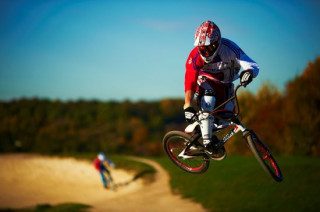
Two further days of the camp followed - including work with the mountain bike Talent Team and an afternoon of racing cycle speedway - but for Hayes, focus had already shifted to an Induction Camp in review and consideration of the next Talent Team gathering due to take place as part of the Youth Sport Trust Awards - something for which he cannot hide his excitement.
"If the riders thought this camp was hard; mentally and physically there is another test to come. Ultimately, the reward will be worth it and from the Induction Camp we've created a good work ethic that sets us in good stead for the coming season."

Talent Team Roster 2010/11 - Riders Aged 14-17
Ben Clarkson (Year 3)
Charlotte Green (Year 3)
Ayesha McLelland (Year 2)
Jacob Roberts (Year 2)
Dan Pullen (Year 2)
Ryan Stack (New)
Quillan Isidore (New)


